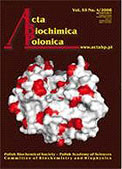Krizkova S, Masarik M, Majzlik P, Kukacka J, Kruseova J, Adam V, Prusa R, Eckschlager T, Stiborova M, Kizek R. Acta Biochim Pol. 2010 57(4):561–6. IF: 1.262

Abstract:
Tumour markers are substances produced by malignant cells or by the organism as a response to cancer development. Determination of their levels can, therefore, be used to monitor the risk, presence and prognosis of a cancer disease or to monitor the therapeutic response or early detection of residual disease. Time-consuming imaging methods, examination of cerebrospinal fluid or tumour tissue and assays for hormones and tumour markers have been used for cancer diagnosis. However, no specific marker for diagnosis of childhood solid tumours has been discovered yet. In this study, metallothionein (MT) was evaluated as a prospective marker for such diseases. Serum metallothionein levels of patients with childhood solid tumours were determined using differential pulse voltammetry – Brdicka reaction. A more than 5-fold increase in the amount of metallothionein was found in sera of patients suffering from cancer disease, compared with those in sera of healthy donors. The average metallothionein level in the sera of healthy volunteers was 0.5 ± 0.2 μmol.dm–3 and was significantly different (p < 0.05, determined using the Schefe test) from the average MT level found in serum samples of patients suffering from childhood solid tumours (3.4 ± 0.8 μmol.dm–3). Results found in this work indicate that the MT level in blood serum can be considered as a promising marker for diagnostics, prognosis and estimation of therapy efficiency of childhood tumours.
-az-